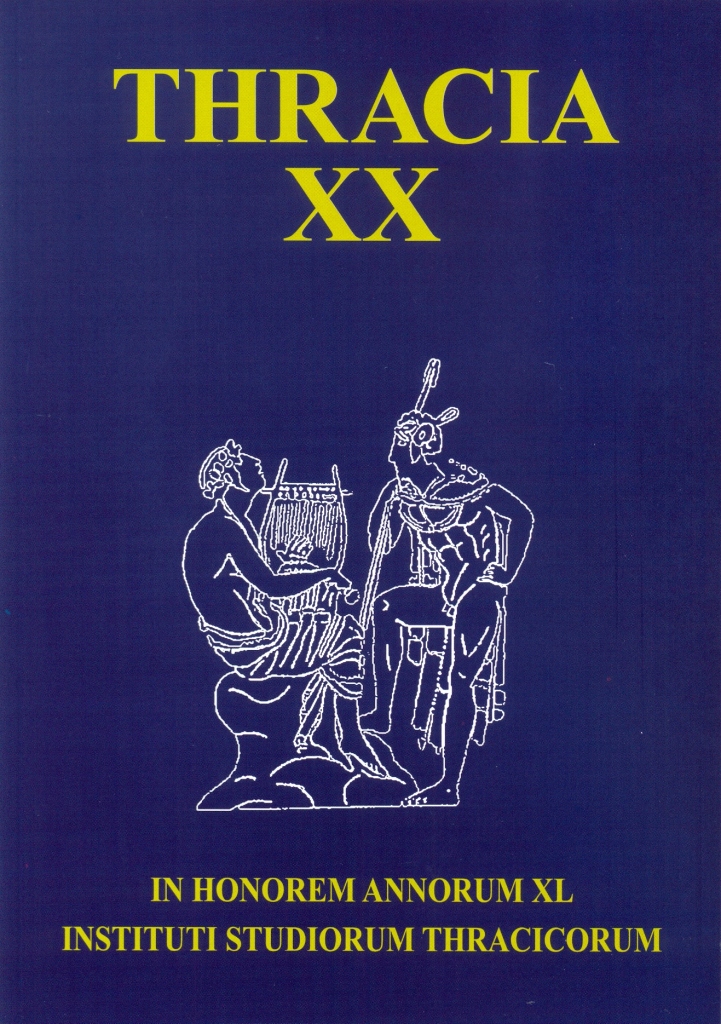Тракийските експлозивни съгласни 1. Ономастичният материал
Thracian Plosive Consonants
1. Onomastics
Author(s): Svetlana YanakievaSubject(s): History, Language and Literature Studies, Local History / Microhistory, Ancient World, Phonetics / Phonology, Lexis, Historical Linguistics
Published by: Институт за балканистика с Център по тракология - Българска академия на науките
Summary/Abstract: In connection with the key issue in Thracian phonetics of the graphic variants with alternation of voiceless and voiceless aspirated plosive consonant and variants with alternation of voiced and voiceless consonant different kind of Thracian names have been examined in the paper: hydronyms (Ἄèсõò/ Iatrus/ Ieterus, Ἀèэсáò/ Atyras, Иéáгüëá/ Tiagula, Pathissus/ Parthiscus/ Πáсôßσêον, ФÝáсοò/ ИÝáéсοò, Utus/ Uthis, Timachus/ Timacum, *Óáëäοâõσσοò/ *Óáëôοâõσσοò, Pingus/ Pincus etc.); personal names (like Áěáäοêοò/ Amadochus, Áõëοõêåνèοò/ Aulucentus, Dentis/ Дåνèéò, Danda/ Дáνôù, Еπôησõ÷οò/ Еπôησõêοò, Еπôáêåνèοò/ Eftecentus, Zimarcus/ Жéěáс÷οò, Жåéπáò/ Жåéâáò, Кåôсéποсéò/ Кåäсéποëéò, ÓéôЬëêηò/ Sithalcus, Óπáсôáêοò/ Sparticus/ Óπáсôõ÷οò); settlement names (Ἀсгßäáõá/ Arcidava, Дßåсνá/ Tierna, Кэшåëá/ Chympsala, Мηêэâåсνá/ Мηêэπåсνá, Sparton/ Sparthon, ФЬсáνôοò/ ДЬсáνäοò, Фüěοé/ Thomi); tribal names (Всэгåò/ Всэêåò, Дüëοгêοé/ Dolongi, Ксησôῶνåò/ Γсáσôῶνåò, Фсáõσοß/ Thrausi); god epitheta (Кåνäсåéσοò, Кåνäсåéσåéá/ Кåνôсåéσåéá) etc. The usual explanation of this phenomenon is that it was due to the shifting of consonants in the Thracian language. The following view is substantiated in the paper: The occurrence of names with the variants aspirated/non-aspirated consonants was territorially spread from Dacia, Moesia and Scythia Minor (Pathissus, Ἄèсõò, Thomi, Amadochus) to the Propontis, the Aegean Sea and the islands (Ἀèэсáò, ἈèсõÀëáôοò). Consequently, this variation is not due to the different presence of the Indo-European consonant in two different languages or dialects. A look at the variation of aspirated/non-aspirated consonant shows that some forms with aspirated consonants are earlier than those with non-aspirated ones, as in Ἄèсõò and Timachus, whereas in others they are later (Amadochus, Breierophara, Sithalcus, Óπáсôõ÷οò); in a third category it is not possible to determine a chronological difference (Еπôησõ÷οò, Жéěáс÷οò). Hence, the phenomenon was not a result of any internal linguistic evolution either. In the light of these facts a more appropriate explanation of the cited graphic variants can be the following: the voiceless plosive consonants in Thracian, due to their different pronunciation compared to the Greek sounds (probably more tense), were also rendered by means of Greek aspirated consonants, which was possible because such consonants were absent in Thracian. There is also the possibility of dual use of the Greek aspirated consonants: on the one hand, for voiceless plosives, and on the other – for spirants. The rendering of a dental spirant can possibly be assumed for some rare cases of è/ σ alternation as in Дåνèåëῆôáé/ Denseletae, Жâåëèοõсäοò/ Жâåëσοõсäοò and Óåэèáò with the form of the genitive variant Óηõσá. In variants of names rendered in some cases by means of a voiced and in other cases – by a voiceless consonant, the explanation should probably be sought again in the imprecise correspondence between the Thracian and Greek or Latin voiced consonants, that is why voiceless consonants were also used in some cases for the graphic rendering of the Thracian ones. The examples of double writing with voiced and voiceless consonant are much fewer than those of alternation of voiceless and voiceless aspirated ones, which might be assumed as an indirect confirmation of the idea of absence of aspirated voiceless consonants in Thracian. I believe that for this reason the Greek aspirated consonants may have also been used to render simple voiceless consonants, whereas the presence of voiceless consonants limited the double transcriptions of the voiced consonants, in spite of their different (softer) pronunciation compared to the respective Greek sounds.
Journal: Thracia
- Issue Year: 2012
- Issue No: 20
- Page Range: 331-349
- Page Count: 19
- Language: English, Bulgarian
- Content File-PDF

